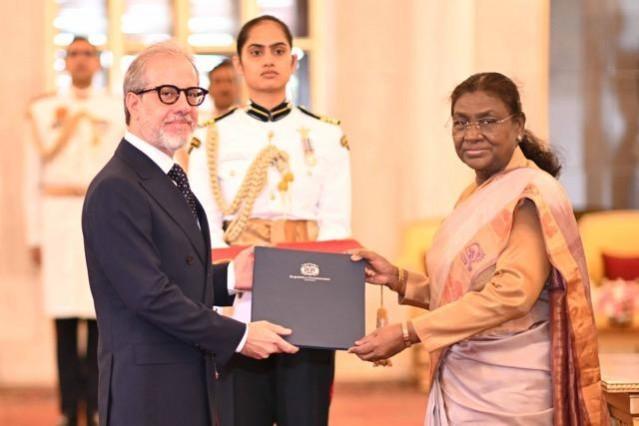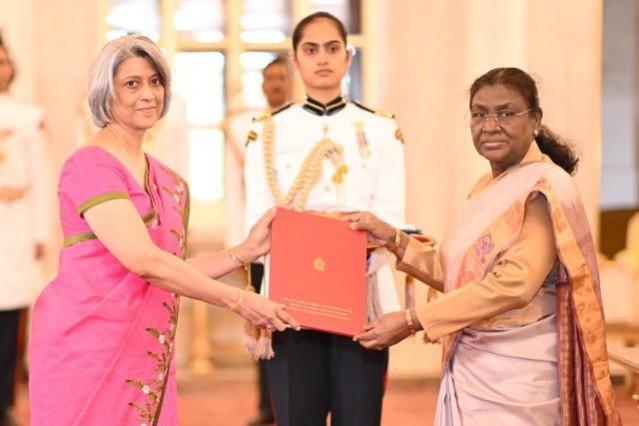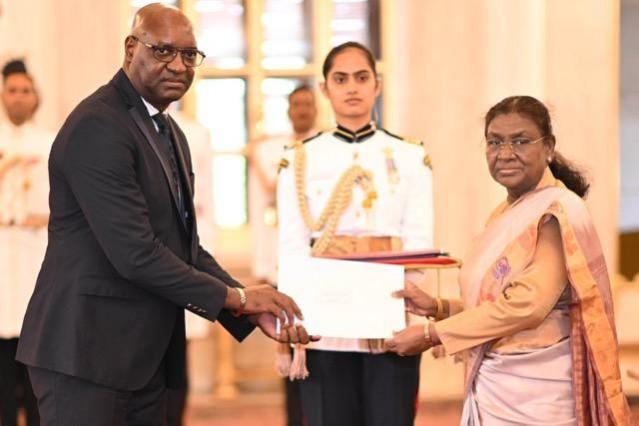
In a significant diplomatic event, President Droupadi Murmu received the credentials of Ambassadors and High Commissioners from the Dominican Republic, Timor-Leste, Sri Lanka, and the Gabonese Republic.
The ceremony, held at Rashtrapati Bhavan, marked an important step in India's ongoing efforts to strengthen international relations. The Rashtrapati Bhavan confirmed the acceptance of credentials through a post on X, stating, "President Droupadi Murmu received credentials from Francisco Manuel Compres Hernandez, Ambassador of the Dominican Republic; Karlito Nunes, Ambassador of the Democratic Republic of Timor-Leste; Pradeepa Mahishini Colonne, High Commissioner of the Democratic Socialist Republic of Sri Lanka; and Guy Rodrigue Dikayi, High Commissioner of the Gabonese Republic, at Rashtrapati Bhavan."

This event is part of a series of diplomatic engagements that President Murmu has been conducting to foster stronger ties with countries worldwide. Earlier in the year, on May 29, she accepted the credentials of envoys from six other nations, including Thailand, Costa Rica, Saint Kitts and Nevis, Turkey, Bangladesh, and Kazakhstan. The President's Secretariat released a statement detailing these engagements, highlighting India's commitment to enhancing bilateral relations.
President Droupadi Murmu received credentials from Mr Francisco Manuel Compres Hernandez, Ambassador of the Dominican Republic; Mr Karlito Nunes, Ambassador of the Democratic Republic of Timor-Leste; Ms Pradeepa Mahishini Colonne, High Commissioner of the Democratic Socialist… pic.twitter.com/2A7bmkvCdj
— President of India (@rashtrapatibhvn) July 29, 2025
The acceptance of credentials is a formal diplomatic procedure that signifies the official recognition of an ambassador or high commissioner by the host country. It allows the envoy to officially represent their country and engage in diplomatic activities, reflecting the host country's willingness to engage in dialogue and cooperation with the sending nation.

Strengthening global ties
The recent ceremony at Rashtrapati Bhavan is part of India's broader strategy to strengthen its diplomatic ties with countries around the world. By accepting the credentials of envoys from diverse regions, India is signaling its commitment to fostering international cooperation and dialogue. This approach aligns with India's foreign policy objectives, which emphasize the importance of building strong bilateral and multilateral relationships.
President Droupadi Murmu received credentials from Mr Alonso Correa Miguel, Ambassador of the Republic of Panama; Mr Dharamkumar Seeraj, High Commissioner of the Cooperative Republic of Guyana; and Dr Mohammed Abdalla Ali Eltom, Ambassador of the Republic of Sudan, at Rashtrapati… pic.twitter.com/2zOTIGuFFR
— President of India (@rashtrapatibhvn) February 20, 2025
Diverse diplomatic engagements
The acceptance of credentials from the Dominican Republic, Timor-Leste, Sri Lanka, and the Gabonese Republic is particularly noteworthy given the diverse backgrounds and geopolitical significance of these countries. The Dominican Republic, located in the Caribbean, is known for its vibrant culture and growing economy.

Timor-Leste, a Southeast Asian nation, has been making strides in its development efforts since gaining independence in 2002. Sri Lanka, a close neighbor of India, shares historical and cultural ties with the country, making its diplomatic relationship with India particularly important. The Gabonese Republic, located in Central Africa, is rich in natural resources and has been working towards sustainable development.
The ceremony also comes at a time when global diplomacy is facing numerous challenges. Geopolitical tensions, economic uncertainties, and environmental concerns are some of the issues that require concerted efforts from the international community.
Navigating diplomatic challenges
Furthermore, the relationship between India and Bangladesh has experienced challenges following political developments in Bangladesh. The departure of former Prime Minister Sheikh Hasina to India amid anti-government protests and the subsequent political instability in Bangladesh have affected bilateral relations. These developments highlight the importance of diplomacy in managing complex international relationships and addressing issues that may arise.
Related














